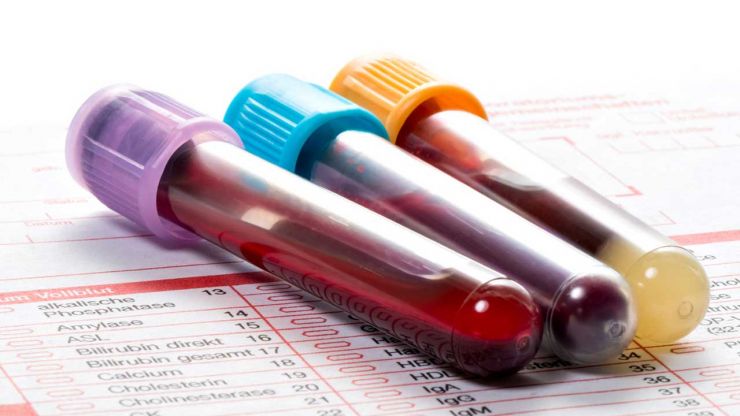Blood Tests and Lab Tests
It is not uncommon for patients with back or neck pain to need blood work or other test in a laboratory. Certainly, if you are being scheduled for spine surgery, it is important for your surgeon and his/her team to know ahead of time the results of different tests. List below are many different types of blood tests that a doctor may order. Some of these tests can help diagnose the cause of a spinal disorder.
Complete blood count (CBC): A drop of blood contains a number of different cell types, including red blood cells (erythrocytes), macrophages, neutrophils, basophils, eoisinophils, B lymphocytes, and T lymphocytes, among others. Differences in the number or appearance of any of these cell populations might serve as an indication of some underlying illness. The list of possibilities is far too long to delineate here.
Erythrocyte sedimentation rate (ESR): This measure indicates the rate at which red blood cells settle out in a tube. An increased rate of sedimentation can serve as sort of general indicator of inflammation in the body.
Alanine aminotransferase (ALT): The activity of this enzyme is measured in blood plasma. Elevated levels of this enzyme can be an indication of viral hepatitis and other forms of liver disease.
Total protein: Measurement of the total protein concentration in plasma. Elevated concentrations reflect dehydration, which might be attributable to vomiting, diarrhea, Addison's disease, diabetic acidosis, and other conditions.
Albumin: Albumin is the most abundant protein found in blood plasma, representing 40 to 60% of the total protein. Reduced levels of albumin may reflect a variety of conditions, including primary liver disease, increased breakdown of macromolecules resulting from tissue damage or inflammation, malabsorption syndromes, malnutrition, and renal diseases.
Globulin: Globulins are a diverse group of proteins in the blood, and together represent the second most common proteins (after albumin) in the bloodstream. An elevation in the level of serum globulin can indicate the presence of cirrhosis of the liver.
Alkaline phosphatase (ALP): Alkaline phosphatases are a family of enzymes that are present throughout the body. Elevated levels of ALP are associated with liver and bile duct disorders, and bone diseases.
Calcium: Increased levels of plasma calcium may indicate the presence of malignant disease or hyperparathyroidism. Less commonly, it could reflect thyrotoxicosis, vitamin D intoxication, the use of thiazide diuretics, sarcoidosis, and other disorders. Reduced levels of calcium may reflect vitamin D deficiency, renal disease, hypoparathyroidism, magnesium deficiency and other disorders.
Phosphorus: Increased levels of plasma phosphate ion may indicate imminent renal failure, hypoparathyroidism, acromegaly, excessive phosphate intake, and vitamin D intoxication. Sharply decreased levels of plasma phosphate may reflect vitamin D deficiency, primary hyperparathyroidism, magnesium deficiency, and diabetic ketoacidosis.
Glucose: Elevated blood glucose levels may be an indication of diabetes mellitus. Lower-than-normal blood glucose levels (hypoglycemia) can be caused in a variety of ways, often transiently, and must be examined under specific clinical conditions before relating this finding to any clinical disorders.
Blood urea nitrogen (BUN): Various renal diseases can lead to an increase in the concentration of urea in blood plasma.
Electrolytes: This test measures the levels of charged ions dissolved in the blood and urine, including sodium, potassium, calcium, magnesium, chloride, bicarbonate, phosphate, sulfate, and lactate. Virtually all the metabolic processes in the body are dependent on the presence of these charged ions, the concentrations of which are tightly controlled. Deviations from normal levels of each of these cautions can reflect a wide variety of clinical problems, too numerous to detail here.
Creatinine: Elevated levels of plasma creatinine may indicate impaired renal function.
Thyroid stimulating hormone (TSH): This is a test of thyroid function. Higher-than-normal levels of TSH may indicate hypothyroidism and lower-than-normal levels may suggest hyperthyroidism. In rare instances, elevated TSH levels may be caused by pituitary tumors.
Urinalysis: Urine may be examined for a variety of diagnostic indicators, including amylase, bilirubin, creatinine, sugars, g-glutamyl transferase, hemoglobin, lactate dehydrogenase, osmolality, electrolytes, myoglobin, protein, urea, and many more. Elevated amylase levels can indicate pancreatic disease; increased urine bilirubin levels signal liver damage or disease; high serum g-glutamyl transferase suggests biliary obstruction, cholangitis, cholecyctitis and alcoholic cirrhosis; increased lactate dehydrogenase in urine is associated with glomerulonephritis, systemic lupus erythematosus, diabetic nephrosclerosis, and bladder and kidney malignancies; and so forth.
